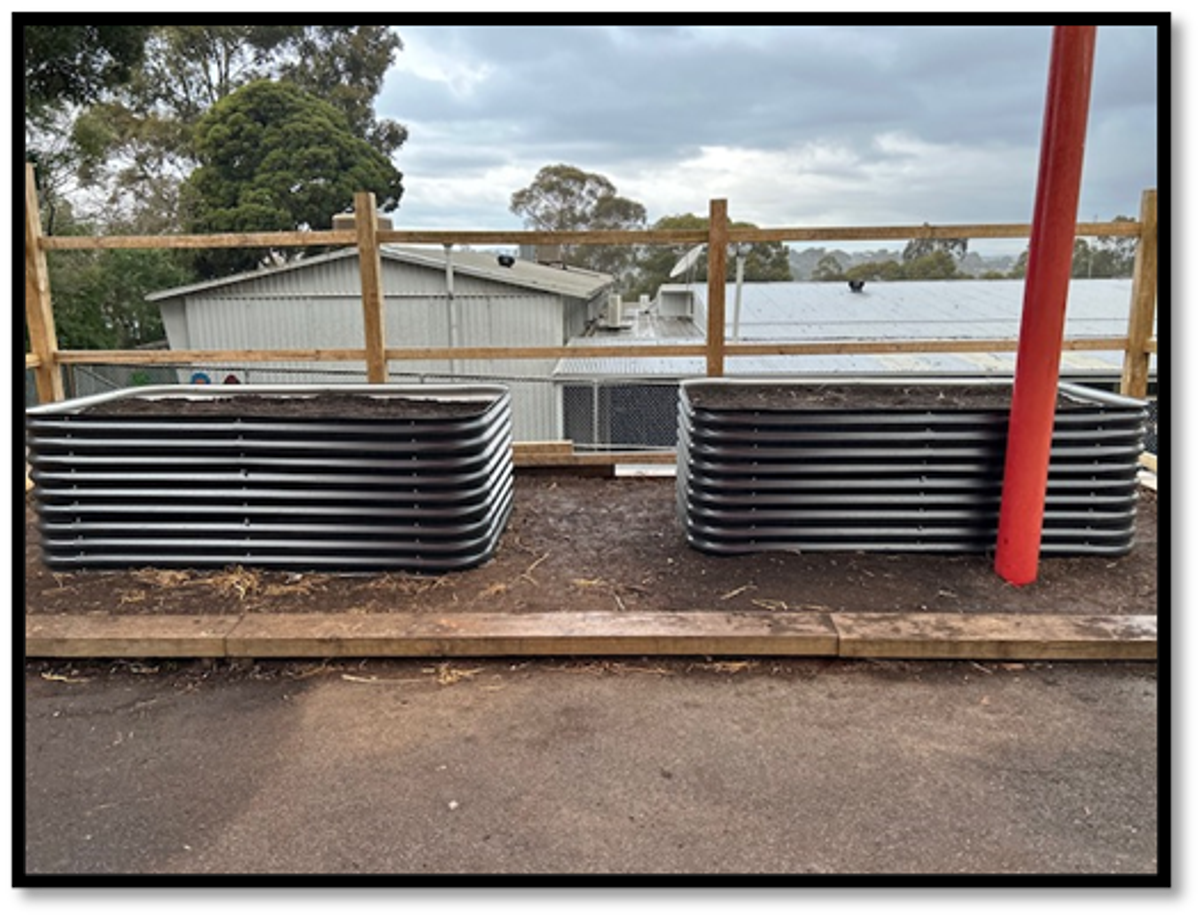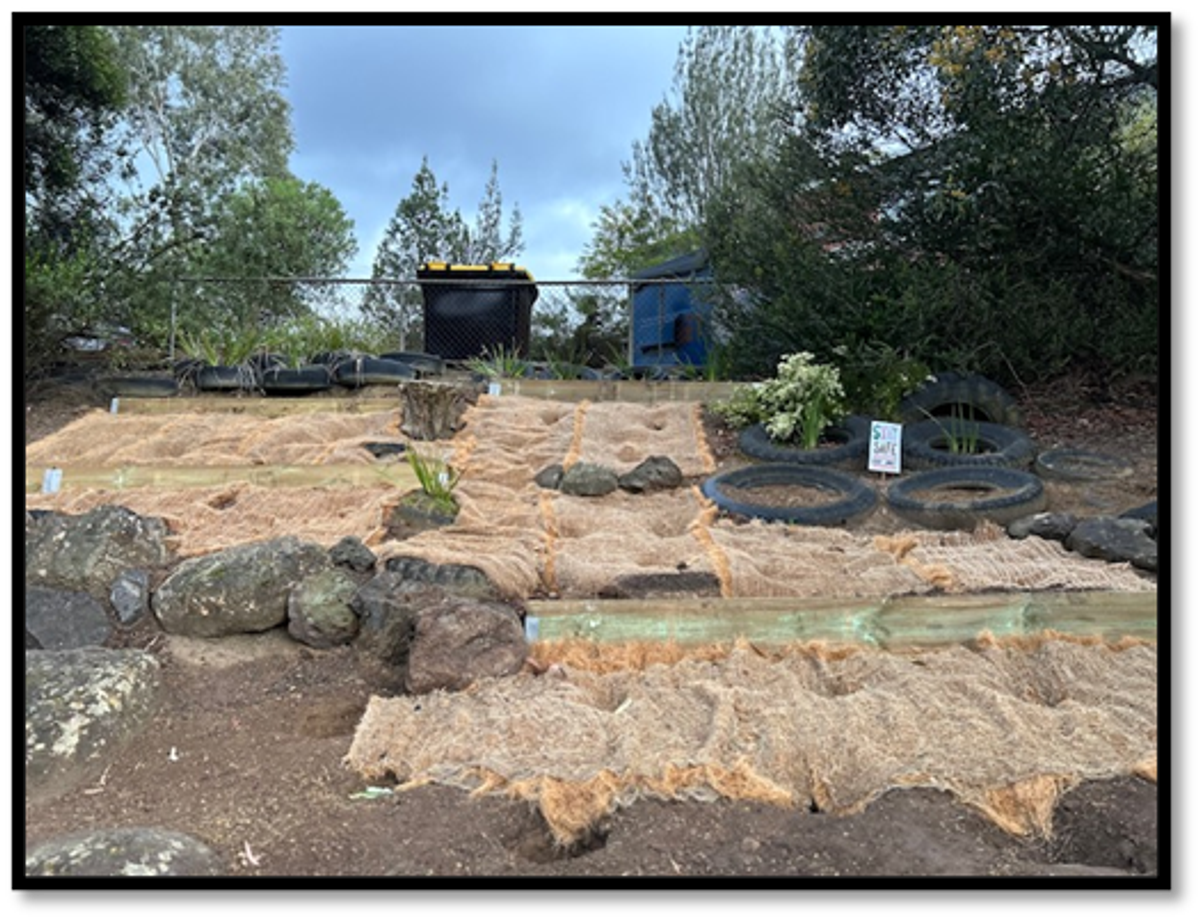A note from Mrs Whitechurch

Working Bee Thanks
A big thank you to our school community for supporting the multiple programs that we have across the school. It is wonderful to see so many parent helpers in and outside the classroom. A special thanks to all the hardworking families who participated in the working bee last Saturday.
This band of diligent, determined workers created sleeper walls, prepared banks for planting and protection from erosion, assembled raised garden beds, cleaned out gutters, painted lines, cleaned out the chicken coup and collected rubbish from the playground. A highlight for our chickens is the new dust bath made from an old tyre and some sand. Dust bathing is essential for our chicken's health and happiness.
Sustainability Team
It was great to join the Sustainability Team meeting this week. Our Sustainability Leaders are passionate about coming up with an effective plan that will inspire everyone to keep our yard clean and demonstrate how proud we are of our school. New bins and a review of our bin placements are just a couple of their ideas. Stay tuned for more or come to our whole school assembly this week to hear their great ideas!
Fathers and Special Others Day
A big thank you to Jackie Arbuckle and the group of parents that will be assisting her in running our Fathers and Special Others Day Stall tomorrow. All your work in setting up the stall this afternoon in preparation for tomorrow is greatly appreciated.
Planning Week
Our Planning Week is scheduled for Week 9 this term. Planning Week enables teachers to reflect on student learning, collaborate together and plan and prepare for the term ahead. Students will participate in all Specialist classes on their allocated planning day.
Maths Coaching
Our teachers are continuing to develop and extend their knowledge of the teaching of numeracy. Through a Maths Coaching experience this week, teachers collaborated with a Maths coach and spent time discussing and reviewing student learning. This Maths coaching model will be explored even further next term.
Smile Squad Treatment Van
This week the Smile Squad team from Banyule Community Health have been at RPS providing free dental care. The Smile Squad Van has now arrived and identified students will be receiving free treatment at school. This is a wonderful service.
Wellbeing
raisingchildren.net.au is a fantastic online resource for parents of children of all ages. Below is an article titled: ‘Self-Regulation in Children and Teenagers.’
Key points
- Self-regulation is the ability to understand and manage your own behaviour and reactions.
- Self-regulation helps children and teenagers learn, behave well, get along with others and become independent.
- Self-regulation begins to develop rapidly in the toddler and preschooler years. It continues to develop into adulthood.
- Ways to develop your child’s self-regulation include talking, planning, problem-solving and role-modelling.
What is self-regulation?
Self-regulation is the ability to understand and manage your behaviour and your reactions to feelings and things happening around you.
It includes being able to:
- regulate reactions to strong emotions like frustration, excitement, anger and embarrassment.
- calm down after something exciting or upsetting.
- focus on a task.
- refocus attention on a new task.
- control impulses
- behave in ways that help you get along with other people.
Why self-regulation is important
As your child grows, self-regulation helps them:
- learn at school – because self-regulation gives your child the ability to sit and listen in the classroom.
- behave in socially acceptable ways – because self-regulation gives your child the ability to control impulses.
- make friends – because self-regulation gives your child the ability to take turns in games and conversation, share toys, and express emotions in appropriate ways.
- become more independent – because self-regulation gives your child the ability to make appropriate decisions about behaviour and learn how to behave in new situations with less guidance from you.
How and when self-regulation develops
Children develop self-regulation through warm and responsive relationships. They also develop it by watching the adults around them.
Self-regulation starts when children are babies. It develops most in the toddler and preschool years, but it also keeps developing right into adulthood.
For example, babies might suck their fingers for comfort or look away from their caregivers if they need a break from attention or are getting tired.
Toddlers can wait short times for food and toys. But toddlers might still snatch toys from other children if it’s something they really want. And tantrums happen when toddlers are overwhelmed by strong emotions.
Preschoolers are starting to know how to play with other children and understand what’s expected of them. For example, a preschooler might try to speak in a soft voice if you’re at the movies.
School-age children are getting better at controlling their own wants and needs, imagining other people’s perspectives and seeing both sides of a situation. This means, for example, that they might be able to disagree with other children without having an argument.
Preteens and teenagers are better at planning, sticking with difficult tasks, behaving in socially appropriate ways, and considering how their behaviour affects other people. For example, your teenage child might think about your perspective when they’re negotiating with you about their curfew.
Children who typically feel things strongly and intensely find it harder to self-regulate. It isn’t as hard for children who are more easy going. Even older children and teenagers sometimes struggle with self-regulation.
Helping children and teenagers learn and practise self-regulation
Here are some practical ways you can help your child learn and practise self-regulation:
- Work on your child’s skills for understanding and managing emotions.
- Use calming down strategies for toddlers, calming down steps for preschoolers and school-age children and calming down steps for pre-teens and teenagers.
- Plan for challenging situations where it might be hard for younger children to behave well. For example, ‘The shop we’re going to has lots of things that can break. It’s OK to look, but please don’t touch’. Give your child a gentle reminder as you enter the shop. For example, ‘Remember – just looking, OK?’
- Involve pre-teens and teenagers in problem-solving and negotiating difficult situations. For example, ‘I'm working all weekend, so I know it’ll be boring for you. Let’s figure out how you can make the most of the time’.
- Praise your child when they show self-regulation and manage a tricky situation. For example, ‘You were great at waiting for your turn’, or ‘I liked the way that you shared with Sam when he asked’.
- Try to model self-regulation for your child. For example, ‘I’d really like to keep gardening, but if I don’t clean up now, I won’t get you to soccer on time’. Or ‘Let me write that on the calendar so I don’t forget’.
Have a great week!
Lynda Whitechurch
ActingPrincipal





